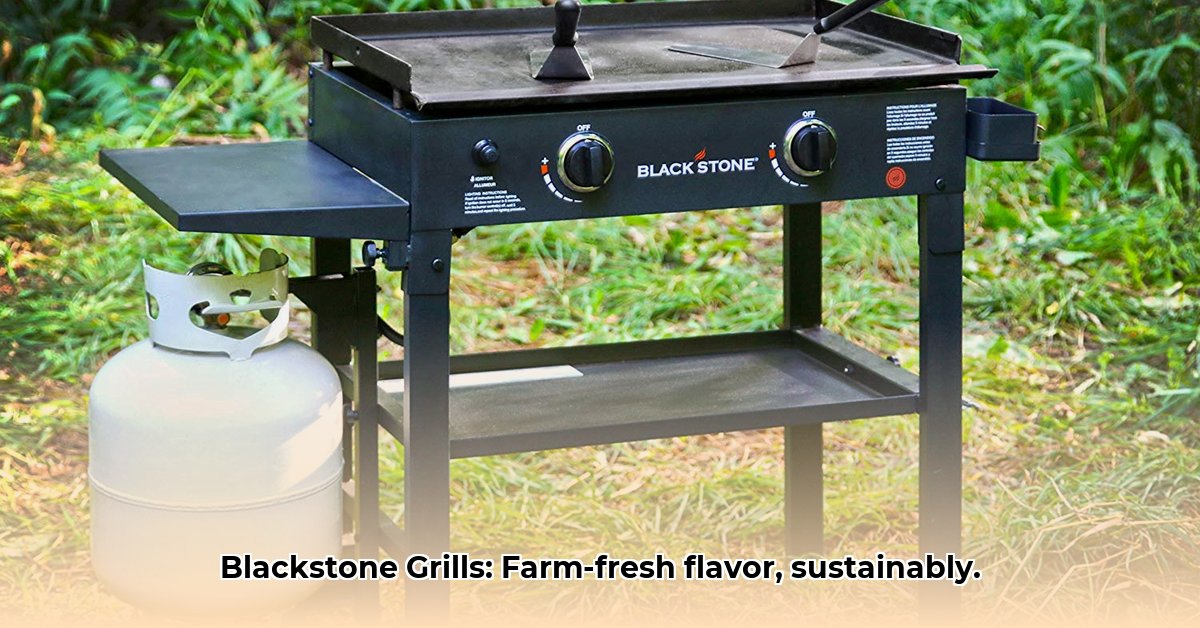
Farming is demanding, and after a long day, the convenience of a Blackstone grill might seem appealing. But is using a Blackstone grill truly sustainable for your farm? This article explores the environmental impact of Blackstone grills, examining fuel usage, material sourcing, lifespan, and potential for integration into sustainable farming practices. We'll analyze both the advantages and disadvantages, providing a nuanced perspective to inform your decision-making process. For building other sustainable farm structures, check out this helpful resource: chicken tractor plans.
The Energy Equation: Propane's Impact on Sustainability
Blackstone grills typically run on propane, a fossil fuel with a carbon footprint. Compared to constantly running indoor electric appliances, however, a propane grill could potentially offer energy savings. More research is needed to definitively quantify this energy tradeoff, as factors like grill efficiency, food preparation methods, and appliance energy consumption vary greatly. The environmental cost of propane production and transportation also needs careful consideration. While propane offers convenience, its carbon footprint remains a significant factor in assessing its sustainability.
Material Matters: Longevity and Sustainable Sourcing
The grill's lifespan and the materials used in its construction play a critical role in its overall environmental impact. A durable, repairable grill made with recycled or sustainably sourced materials is a far more environmentally responsible choice than a cheaply made, disposable model. The length of time a grill remains in use significantly reduces the environmental burden compared to frequent replacements. Consider grills with easily replaceable parts and durable construction. This represents a larger investment upfront, but the long-term environmental benefits are substantial.
Blackstone Grills and Farming: Opportunities for Integration
Rather than simply viewing a Blackstone grill as a potential source of emissions, let's consider its potential integration into a farm's overall sustainability strategy. The ashes from grilling and food scraps can be valuable additions to compost piles, creating nutrient-rich soil amendments. This closed-loop system minimizes waste and enhances soil fertility, aligning with the principles of sustainable agriculture. This aspect of Blackstone grill use often gets overlooked.
Practical Steps Towards Sustainable Grilling
The following actions, tailored for various stakeholders, offer a framework for minimizing the environmental impact of Blackstone grills:
Actions for Sustainable Grilling:
1. Tractor Supply: Increase the availability of grills constructed with recycled and sustainably-sourced materials. Offer repair services and maintenance workshops for extending the grills' lifespan. This encourages responsible consumption habits.
2. Consumers: Prioritize durable and repairable grills. Use the grill efficiently, reducing propane consumption. Compost food scraps from grilling, reducing waste and enriching the soil. Support manufacturers committed to sustainability.
3. Farmers: Integrate grill waste into their composting systems. Explore renewable energy sources to reduce reliance on propane. Consider the whole farm system to maximize efficiency and minimize waste.
Navigating the Nuances: A Balanced Perspective
The sustainability of Blackstone grills is not a simple binary equation. While propane use presents environmental challenges, the potential for energy savings compared to electric appliances, along with the possibility of integrating grill waste into composting schemes, offers a more complex picture. The key lies in mindful consumption, responsible sourcing, and integration into broader farm sustainability initiatives. The long-term impacts require further research and development of more sustainable manufacturing practices and grill technologies.
Reducing the Environmental Impact of Propane Grills on Farms
The use of propane grills on farms presents a clear need to offset their environmental impacts. While convenient, propane's carbon footprint necessitates a focus on mitigating strategies.
Minimizing Propane's Environmental Footprint
Propane production, transportation, and potential leaks contribute to greenhouse gas emissions. The manufacturing and eventual disposal of the grill add to the overall environmental cost. However, the consistent and efficient heat provided by a propane grill offers advantages over open fire methods, particularly in time-constrained farming operations. Thus the emphasis should be placed on responsible and efficient use.
Sustainable Strategies for Propane Grilling:
1. Efficient Operation: Precise cooking techniques and careful maintenance ensure efficient propane use. Regular cleaning prevents performance reduction.
2. Grill Selection and Maintenance: Investing in a high-quality, durable grill extends its lifespan, reducing replacement frequency. Routine maintenance further reduces propane consumption.
3. Propane Sourcing and Leak Prevention: Choosing suppliers with sustainable practices and diligent leak checks further minimize emissions.
Beyond the Grill: Holistic Sustainability
The sustainable approach should extend to broader farm operations. Sourcing local ingredients minimizes transportation emissions, and composting food scraps reduces landfill burden and improves soil health.
Dr. Emily Carter, Professor of Chemical and Biological Engineering at Princeton University, notes: "Sustainable agriculture hinges on reducing emissions across the entire farming process. Focusing solely on one aspect, such as a grill, neglects the larger picture.”
This holistic perspective highlights the importance of integrating sustainable practices throughout the farm, considering the entire system rather than individual components. The journey towards truly sustainable farming – and grilling – requires continued innovation and thoughtful decision-making.